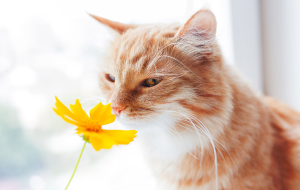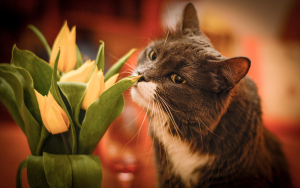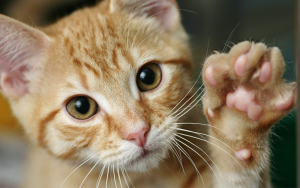Why Does My Cat Lick Me So Much? Understanding the Behavior of Feline Affection

Cats are fascinating creatures with mysterious ways of communicating, and one of the most common yet perplexing behaviors is licking. If you’re a cat owner, you’ve likely experienced your feline friend licking you—sometimes excessively. While this behavior
may seem odd or even uncomfortable at times, it is deeply rooted in their instincts and natural habits. So, why does your cat lick you so much? In this article, we will explore the various reasons behind this behavior, from signs of affection to health-related
issues, and help you understand your cat better.
Table of Contents
- Introduction: The Mystery Behind Cat Licking
- Affection and Bonding: How Cats Show Love
- Grooming and Self-Care: Cats as Clean Freaks
- Kittenhood Behavior: The Role of Mother Cats
- Marking Territory: Cats and Scent Communication
- Attention-Seeking Behavior: Does Your Cat Want Something?
- Stress or Anxiety: Emotional Triggers for Licking
- Medical Conditions: When Licking Is a Red Flag
- What to Do if Your Cat Licks Too Much
- Conclusion: Understanding Your Cat’s Unique Needs
1. Introduction: The Mystery Behind Cat Licking
Licking is a natural and instinctive behavior for cats. Whether it’s licking themselves, other cats, or even their human companions, it is often a way for them to communicate or express emotions. While some cats may lick occasionally, others may do so
excessively, leaving their owners wondering if it’s normal or if something is wrong. In this article, we will dive deep into the reasons behind this behavior and give you the knowledge to better understand your feline friend.
2. Affection and Bonding: How Cats Show Love
One of the primary reasons cats lick their owners is as a sign of affection. In the animal kingdom, grooming and licking play an essential role in the social bonding process. Cats often lick each other as a way of expressing love, friendship, and trust.
This behavior is also referred to as allogrooming, and it’s typically observed in cats that share a close relationship.
When your cat licks you, it may be trying to show you affection in the same way. Cats are creatures of habit and often form strong bonds with their human family members. If your cat is licking your hands, face, or other parts of your body, it could be
a sign that they see you as a part of their social group and feel safe and secure around you.
How to Recognize Affectionate Licking
- Gentle Licking: If the licking is soft and rhythmic, it’s likely a sign of affection.
- Purring: If your cat is purring while licking you, it’s a positive sign, indicating comfort and happiness.
- Head-butting: Cats often follow up their licking with head-butting or rubbing against you, further demonstrating their affection.
3. Grooming and Self-Care: Cats as Clean Freaks
Cats are meticulous groomers. In the wild, grooming helps cats maintain their hygiene, regulate body temperature, and protect their fur. Domestic cats retain this instinct, and they often apply it to their owners. When your cat licks you, it may simply
be transferring its grooming behavior onto you, as if you are a part of their “clan.”
Additionally, cats may lick you to clean areas they can’t reach themselves, such as your face or hands. This behavior is often seen in multi-cat households, where one cat will groom another as a form of social care.
How to Tell If It’s Grooming Behavior
- Consistent Licking: If your cat licks you in the same spot over and over, it may be part of their grooming ritual.
- Focus on Clean Areas: Cats typically lick areas where they feel there is a need for cleaning, like your hands, face, or even hair.
4. Kittenhood Behavior: The Role of Mother Cats
Kittens are born helpless and rely heavily on their mother for survival. One of the first things a mother cat does is groom her kittens, licking them to clean their fur and stimulate their bodily functions. This behavior is crucial for bonding and the
survival of the kittens. If your adult cat is licking you, it may be mimicking the motherly care it experienced during kittenhood. This is especially common in young cats or those with a very close bond to their owners.
How to Tell if It’s Kittenhood Behavior
- Repeated Licking: Cats that are very attached to their owners may lick in a repetitive manner, mimicking the care they received from their mother.
- Tender Licking: If the licking is gentle and nurturing, it could be a reflection of maternal instincts.
5. Marking Territory: Cats and Scent Communication
Cats are territorial creatures, and they use scent as a primary means of communication. When your cat licks you, it may be marking you with its scent, thereby claiming you as part of its territory. This behavior is often seen in cats that are particularly
affectionate or possessive over their owners. Through this act, your cat may be signaling to other animals that you belong to them, reinforcing the bond between the two of you.
How to Recognize Marking Behavior
- Persistent Licking: If your cat licks you frequently, especially after you’ve been away or in the presence of other animals, it may be a form of scent marking.
- Rubbing Against You: Cats may also rub their face against you to deposit scent from glands located around their cheeks and chin.
6. Attention-Seeking Behavior: Does Your Cat Want Something?
Cats are known to be independent, but they can also be quite needy when they want something from their human companions. If your cat licks you excessively, it might be trying to get your attention. Cats may lick their owners when they want food, affection,
or even playtime. If your cat is licking and then staring at you, it’s likely trying to communicate its needs.
How to Tell If It’s Attention-Seeking
- Licking Followed by Staring: If your cat licks you and then looks at you expectantly, it’s probably hoping for something.
- Meowing or Restlessness: Licking combined with meowing, pawing, or following you around can be a sign that your cat is seeking attention or food.
7. Stress or Anxiety: Emotional Triggers for Licking
While licking is often a positive behavior, excessive licking can sometimes be a sign of stress or anxiety. Cats may lick themselves, their owners, or objects in their environment as a coping mechanism when they are feeling overwhelmed. Changes in their
routine, environment, or the introduction of new animals or people can cause stress, triggering this behavior.
How to Tell if It’s Stress-Induced Licking
- Excessive Licking: If your cat is licking you or itself nonstop, it could be an indication of anxiety.
- Other Signs of Stress: Hiding, aggression, or a lack of appetite can accompany stress-related licking.
8. Medical Conditions: When Licking Is a Red Flag
In some cases, excessive licking can be a sign of underlying medical conditions. Conditions such as allergies, infections, or skin irritations can cause discomfort, prompting your cat to lick in an attempt to soothe itself. If your cat is licking you
in a way that seems frantic or obsessive, it’s important to consult with a veterinarian to rule out any health issues.
Common Medical Causes of Excessive Licking
- Fleas or Allergies: Licking can be a response to itching caused by fleas, allergies, or skin conditions.
- Infections or Wounds: If your cat has a cut, scrape, or other injury, it might lick the area to clean it.
- Pain or Discomfort: Cats may lick their owners or themselves as a way to soothe pain or discomfort caused by internal or external issues.
9. What to Do if Your Cat Licks Too Much
If your cat’s licking becomes excessive or seems out of the ordinary, it’s essential to address the underlying cause. Here are a few steps to consider:
- Consult a Veterinarian: If you notice changes in your cat’s licking behavior, it’s important to get a professional opinion. A vet can help rule out medical conditions and offer solutions.
- Address Stressors: If the licking is stress-related, consider making adjustments to your cat’s environment. Adding more playtime, offering hiding spots, and reducing loud noises can help alleviate anxiety.
- Provide Enrichment: Boredom can lead to excessive licking. Make sure your cat has plenty of toys, scratching posts, and interactive playtime to keep it engaged and mentally stimulated.
10. Conclusion: Understanding Your Cat’s Unique Needs
Cats are complex animals, and their licking behavior can stem from a variety of reasons. Whether your cat is showing affection, grooming you, or dealing with stress, understanding the motivations behind this behavior can help you strengthen the bond with
your feline friend. Pay attention to the context and frequency of the licking, and don’t hesitate to seek professional advice if you suspect there is a medical issue. With a little patience and understanding, you’ll be able to decipher your cat’s
unique ways of showing love and communication.
By observing your cat’s behavior and responding appropriately, you can ensure a happy, healthy relationship with your furry companion for many years to come.







